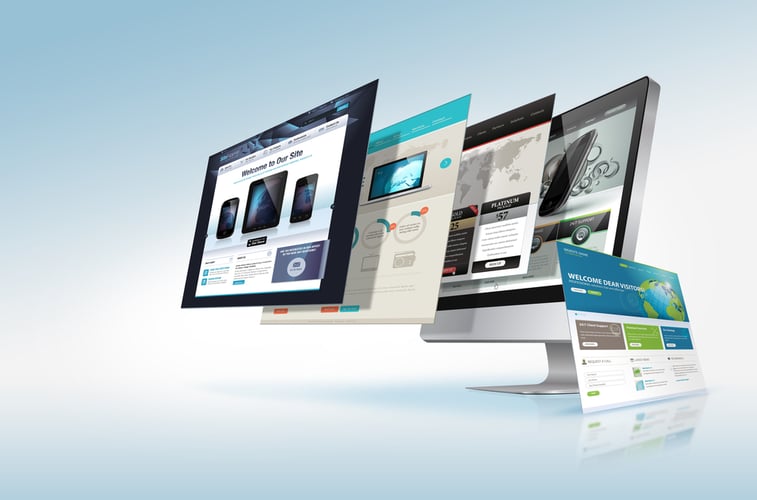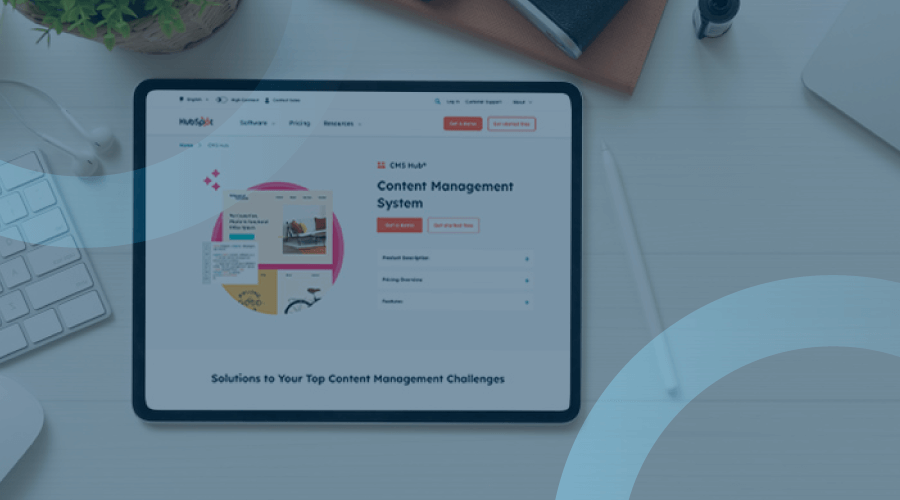Having an online presence is crucial in this day and age. If you don't have one, you're falling behind your competitors.
As I want to help you in this task, in this article, I will explain what a website is, what types of websites exist, and how to determine which one is right for you and your goals.
What is a website?
A website is a collection of web pages that are hosted on a web server and available on the internet.
Through a web browser, users can access the different pages that make up the website and consume its content, whether it be text, images, videos, and more.
A website can have different objectives, from providing information about a company or project to selling products or services, capturing leads, etc. To achieve these objectives, it is important to choose the appropriate type of website.
And to do it correctly, let me tell you about the main types of websites that exist.
Types of websites that exist
1. Institutional website
This type of website focuses on presenting information about a company or institution.
It usually has a clear and organized structure, with sections that provide relevant information about the company's history, mission, vision, values, its team, products, and services offered, among others.
It is also common to include contact sections and forms for users to send inquiries or requests for information.
An institutional website is ideal for companies looking to establish their online presence and build trust and credibility with their customers.
2. E-commerce website
Also known as an online store, this type of website allows users to purchase products or services online.
Generally, it has an intuitive and user-friendly design, with sections that present the products clearly and organized, including images, descriptions, prices, and payment options.
It is important for this type of website to have a robust security system that protects users' information and provides a satisfactory shopping experience.
It is ideal for companies that want to sell their products online and reach a wider audience.
3. Blog
This type of website focuses on presenting articles or news of interest to the general public or the buyer personas of a specific company.
It usually has a simple and clear design, with sections that present the articles in an organized and easy-to-find manner.
It is important for a blog website to have a commenting system that allows users to interact and share their opinions about the articles.
If you have a company that wants to generate quality content and attract new customers, this is the best option! Additionally, it can be combined or placed as a section within a more robust website.
4. Social media website
It allows users to interact with each other and share information, photos, videos, and other elements.
Generally, the design of these websites is attractive and customized, with sections that allow users to create profiles, post content, interact with other users, etc.
The social media website must be secure so that users have confidence in exchanging information, conversations, and more.
It is perfect for companies to interact with their customers and create a community.
5. News website
It focuses on presenting current news in a clear and organized manner.
Normally, it consists of a main section with the most prominent news and secondary sections that present news from different categories, such as politics, sports, culture, etc., depending on the company's focus.
The news website should have an attractive and updated design that allows users to quickly access the information they are looking for.
This type of website is the best option for companies that want to inform their customers about what is happening in the world.
6. Educational website
It is a digital platform that focuses on offering online educational content, such as courses, tutorials, explanatory videos, educational materials, among others.
These websites aim to provide a learning experience through the internet, which can be accessed from anywhere and at any time.
The offered content on an educational website may vary depending on the platform's objective. It can be a complete online course that offers certification upon completion or online tutorials that complement learning in a physical classroom. The content can be offered for free or at a cost.
They are an excellent option for those who want to learn new skills or improve their knowledge in a specific area, as they can access a wide range of educational resources easily and from anywhere.
The companies that should consider creating an educational website are those that want to offer online educational content to their customers or users. This can be useful for companies that want to strengthen their brand image, increase their market reach, and provide added value to their customers.
If you have an institution or project focused on this sector, such as consulting, general education, etc., you should build a website that allows you to upload and store courses so that they are available to your customers.
7. Personal website
This type of website focuses on presenting information about a person, their achievements, experiences, skills, and more.
Independent professionals can benefit greatly from this type of website because they can showcase the work and collaborations they have done and continue to gain work or projects.
Due to its objective, it should include an easy way to contact and some work processes that show how they work or how they meet clients' needs.
It is the best option for freelancers and professionals who have their own independent projects and want to showcase their talent.
8. Microsite
Microsites are often considered a middle ground between a landing page (a single page) and a company website.
They usually have a single page, but it is more extensive than a landing page, as it is focused on providing detailed information about a campaign or a product line.
They have their own URL and can be linked to a larger, more robust official website. The advantage is that being smaller, they are much lighter and load faster.
The companies that choose this type of website are those that want to achieve specific marketing goals, such as an advertising campaign. For this, it should be optimized for SEO and be easy to navigate.
9. Web portals
Web portals collect information from different sources and then curate and provide it to users or frequent consumers of their content.
This type of website focuses on mixing original articles with others found on the web for publication. They can be about a specific topic or multiple topics, depending on the needs and objectives of the company.
Portals require good support because the information they contain is more extensive than other websites. They usually include videos, infographics, text, images, and any other format that helps capture users' attention.
A difference between portals and news websites is that they are not limited to a single media or news agency. Their main objective is for people to access them when they want to find out the most relevant information in an industry, such as movies (IMDb.com), video games, etc.
This type of website is ideal for companies or professionals who want to attract customers or colleagues, as it helps them achieve a high degree of authority in the industry. If successful, it can be launched to the general public.
10. Community Forums
Community forums help you connect with professionals in your field or discuss a problem you're experiencing at work with unknown colleagues.
They are ideal for sharing your knowledge and building it collaboratively.
Depending on the level of topic specialization, there may be certain requirements to join a forum, so registration is usually included to participate on these websites.
Moderators should be present to ensure that the site's objective is not lost and that harmful speeches are not shared with other participants.
It can be about almost any topic, product, etc.
An example of this type of website is Reddit, where you can find different categories and create rooms to discuss a specific topic.
Users contribute content, and depending on the popularity of the entry, it may appear on the homepage or later.
Which type of website is most suitable for you?
That will depend 100% on your business and your objectives. You can even mix different types of websites, such as a corporate website along with a blog to develop a content strategy.
To make the best decision, you need to focus on building a website that:
- Aligns with your objectives and those of your business
- Provides value to your customers or prospects
- Allows you to save time, money, and effort in managing your business
- Fits within your budget and current situation.
Conclusion
Regardless of the type of website you choose for your business or company, remember that it needs to be optimized to navigate and load correctly on any electronic device.
With this article, I'm sure you'll know exactly what website you need, so it's time to get to work.
If you need guidance, don't hesitate to contact us. At Media Source, we have experts in web design and development to help you establish or enhance your online presence.

.png?width=319&height=267&name=gtmetrix_2023%20(1).png)




